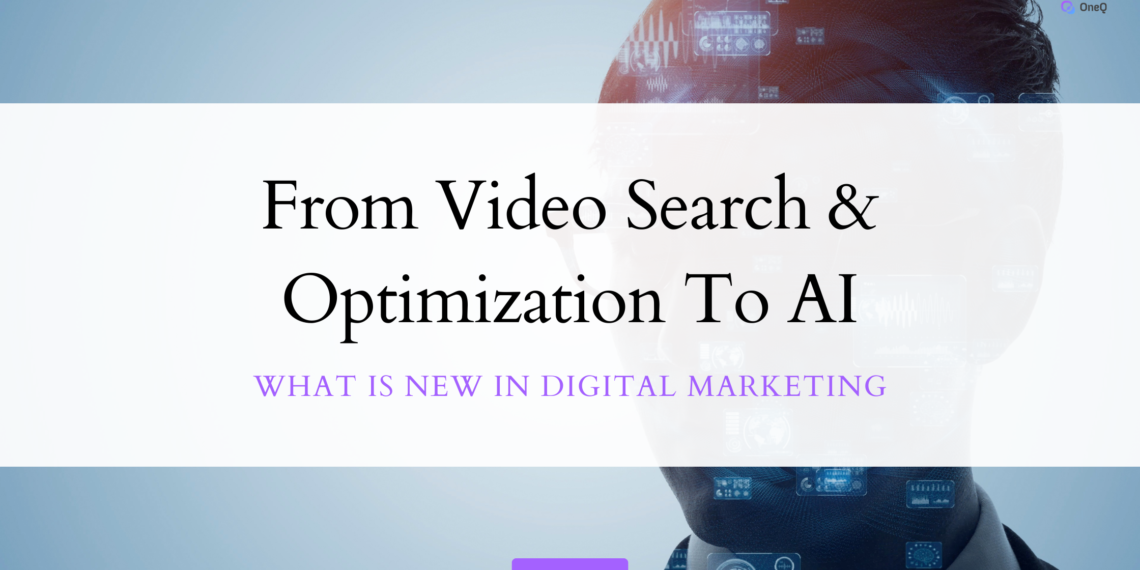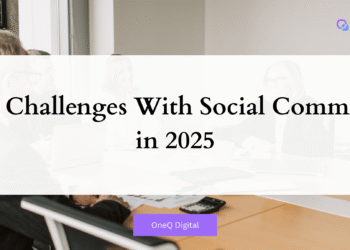Digital marketing is crucial for businesses today. It provides the essential tools to remain competitive and relevant in today’s evolving marketing space. Digital marketing offers exceptional global reach at lower costs than conventional methods, enabling even small startups to expand quickly by accessing wider markets online. Digital marketing also utilizes several technological trends to yield valuable insights from customer data, enhancing understanding of consumer preferences and behaviors.
Analytics derived from digital making allow businesses to tailor their marketing strategies effectively, improving customer engagement and optimizing expenditure for better returns on investment. Interestingly, digital marketing strategies are highly adaptable, allowing businesses to change quickly in response to market trends or consumer feedback.
Emerging Trends in Digital Marketing among Leading Firms
As businesses try to stay relevant and productive in a rapidly evolving digital landscape, staying updated with digital marketing trends is critical to remain competitive. Marketers aiming to leverage technology to drive growth, improve customer engagement, and optimize their campaigns for better returns must stay ahead of these trends.
Adopting these digital marketing trends will enhance operational efficiencies and create new avenues for innovation and customer interaction. Some of the common digital marketing trends include the following.
Voice and Visual Search
With the increased use of smart devices, voice and visual search are gaining momentum. Marketers are now optimizing content for voice queries and image searches, adapting to how consumers increasingly find information and make purchasing decisions.
Video Content Dominance
The dominance of video content can be seen on platforms like TikTok and Instagram Reels. Video content dominance is pushing brands towards more creative and engaging visual storytelling techniques.
Privacy and Ethical Marketing
In response to increased scrutiny over data privacy, digital marketers are refining strategies to respect consumer privacy while delivering impactful marketing messages.
Sustainable Marketing
Consumers are more environmentally conscious, making brands highlight sustainable practices and corporate social responsibility initiatives in their marketing strategies.
Artificial Intelligence (AI)
As digital marketing evolves quickly, artificial intelligence (AI) is at the forefront of this transformation. AI marketing is currently the most significant trend in digital marketing, transforming the industry with its impressive capabilities and innovative applications. It is refining the existing marketing strategies. In the current digital marketing industry, AI is an enhancement and cornerstone technology reshaping how brands engage with consumers.
As AI technology evolves, it is increasingly becoming an indispensable tool for digital marketers. AI provides solutions that make their operations seamless, enhance user engagement, and offer impressive insights into consumer behavior. AI also plays a crucial role in executing some other AI trends, proving how important AI is to digital marketers today.
Why Use AI in Marketing?
AI for marketing has revolutionized the landscape of digital marketing, establishing itself as an indispensable asset for forward-looking industry leaders. AI adoption is no longer merely a strategic advantage but a foundational element for companies intent on leading their markets.
AI enhances operational efficiencies in marketing and dramatically increases engagement and customization, driving businesses toward exceptional growth. With the continual advancement of technology, AI marketing also enriches marketing strategies with its capability for sophisticated data-driven decision-making and predictive analytics.
Understanding and utilizing AI is crucial for marketers aiming to gain a competitive advantage. AI not only provides insight into trending consumer behaviors but also predicts emerging trends. This ensures that marketing strategies are not merely reactive but proactively crafted to align with future market directions. AI supports marketing and catalyzes transformation, enhancing efficiency, insights, and effectiveness at every stage.
AI-Driven Digital Marketing Trends
AI marketing now serves as a secret tool for crafting blog posts, managing customer inquiries, analyzing market trends, and customizing advertising strategies. Furthermore, its capability in predictive analytics significantly improves customer interactions. The shift from traditional SEO techniques to sophisticated AI-driven digital marketing strategies represents a significant advancement in digital marketing.
AI for marketing can transform digital marketing, enhancing personalization, efficiency, and overall impact. As AI advances, we expect to see innovative uses of this technology in digital advertising and marketing strategies.
As a result, businesses experience enhanced ROI and improved customer satisfaction, which are crucial for growth and long-term sustainability. Below are some essential ways AI is being integrated into digital marketing strategies.
Brainstorming
Digital marketers and business owners can use AI to expand their creativity, refine their strategic decision-making, and boost efficiency. AI-powered SaaS tools offer invaluable assistance in generating fresh topic ideas, recommending relevant keywords, and identifying upcoming trends, which are crucial for crafting compelling, data-driven marketing strategies.
For example, tools like ChatGPT can help digital marketers brainstorm robust article headlines and topics, sparking innovative ideas for visual content with minimal input. Using AI in digital marketing this way enhances your marketing efforts and places you at the forefront of technological integration within the industry.
Content Creation
AI content is the new norm. Many digital marketers and business owners now use AI for content creation, which is probably one of the most common use cases of AI in marketing. According to the AI Marketing Benchmark Report, in 2023, about 44% of marketers utilized AI for their content production.
Cutting-edge technologies like HubSpot and ChatGPT have helped improve AI content creation, as they can perform complex tasks that make content creation easy. For instance, they can provide content recommendations, suggest keywords, provide headlines, write outlines, and even generate an entire article based on the topics and keywords provided.
AI can also help with content optimization by analyzing user engagement and behavior, providing valuable insights, identifying areas for improvement, and suggesting strategies for improving your content marketing performance. AI writing tools speed up your content creation process, expediting your workflow.
In addition to quick and efficient content creation, AI website builders and writing assistants use artificial intelligence to improve web pages more rapidly and easily, elevating the quality of business web designs. This helps to make more sophisticated, user-friendly sites more accessible to businesses of all sizes.
Customer Research and Data Analysis
AI tools are excellent at analyzing the performance and effectiveness of past marketing campaigns and identifying the patterns that lead to success. This allows businesses to develop more potent marketing strategies. AI can also help analyze consumer data from a variety of sources, including social media, market trends, and consumer behaviors. This provides important insights for a deeper understanding of what drives the success of your marketing campaigns, enabling precise adjustments to enhance future campaign performance.
Pay-Per-Click Advertising (PPC)
PPC advertising allows you to pay only when someone clicks on your ad. It is an efficient strategy that can help businesses attract new customers through targeted campaigns. PPC can be fine-tuned easily and remains a direct and effective way for businesses to reach their target audience.
Businesses can use AI to improve their PPC campaigns by optimizing keyword research, bidding, targeting, and Ad creation. They can also use it for Ad scheduling and placement, predictive analysis, and fraud detection.
Search Engine Optimization (SEO)
AI is set to significantly reshape SEO due to its immense potential to transform search optimization. Search engines, including Google, have been relying on sophisticated algorithms that rank pages by crawling and indexing them. Today, search engines integrate AI into ranking pages through Search Generative Experience (SGE).
AI can also automate and improve content optimization and keyword research by analyzing user behavior, creating headings, and suggesting effective meta tags. In addition, marketers can utilize AI to predict SEO trends and algorithm updates through predictive SEO, making their strategies more proactive and informed.
Email Marketing
Email marketing is an essential part of any marketing strategy. It continues to be an effective way to convert prospects and engage customers. Using AI tools in your email marketing can save you time and improve performance.
By using AI in emails, businesses can analyze email performance to identify how to optimize their email strategies and perform email scheduling insights and tracking.
Businesses can also create triggered workflows driven by user actions, conduct campaign and workflow analysis, and craft copy tailored to their audience. Businesses can use AI for other email marketing functions, including personalizing content to audience segments, enabling dynamic content, and performing A/B testing.
Customer Experience
Businesses have turned to AI to improve their interactions with customers, enhancing their customers’ experience. According to insights from industry leaders, about 48% of marketing leaders believe that AI significantly transforms customer engagement.
For instance, these businesses use chatbots to provide quick and precise 24/7 customer support and assistance through several platforms, such as their websites, landing pages, and even Facebook Messenger. Some chatbots can handle different inquiries and escalate more complex issues to the customer service teams when expert attention is necessary.
However, AI offers much more when it comes to customers. Businesses can use AI to personalize messages and other content they send to their customers, thereby improving customer experience. AI can also help anticipate customer needs, direct queries or concerns accurately, and streamline purchases.
Customer Segmentation
Customer segmentation and targeting are among the most effective marketing strategies for lead generation and customer acquisition. Customers are divided into distinct groups based on their interests, helping businesses to identify and influence their most valuable customers. However, implementing this strategy manually can be labor-intensive, time-consuming, and costly. AI simplifies this using unique algorithms to efficiently organize prospects and customers according to their needs, behaviors, or interests.
Once these segments are in place, businesses can communicate with their targets and engage them with customized and relevant content. This personalized communication can be fine-tuned and adjusted in real time, ensuring it remains relevant and impactful. Additionally, AI offers recommendation systems that can suggest products, services, promotions, and other offers, enhancing the customer experience.
Mass Optimization
In the past, optimizing product pages for higher conversion rates was a time-consuming, labor-intensive, and resource-straining. But thanks to the rapid adoption of AI, businesses can execute large-scale strategies, surpassing the limitations of the traditional manual optimization methods. AI makes optimization a more scalable and efficient process.
Image and Voice Recognition
Businesses that want to win in this continuously evolving technology age must recognize the power of AI in image and voice recognition. AI-powered image and video recognition technology is changing how businesses optimize their visual content for search and SEO. This impressive technology can identify people and objects by analyzing pictures and videos to understand their context, extracting crucial metadata like descriptions and captions. This also improves how visual content is indexed and found on the internet.
The main advantage of using AI-powered image and video recognition is that it significantly boosts the visibility and relevance of visual media in search results for businesses, SEO professionals, and digital marketers. This makes it easier for potential customers to discover their content online.
Predictive Analysis
Thanks to AI algorithms, manual processing is obsolete. Large quantities of data that would usually take hours or days to process can now be done almost instantaneously. AI can also read and detect patterns and trends, helping businesses and marketers create a solid strategy and make data-driven decisions.
Additionally, predictive AI analytics can enable businesses and sales representatives to foresee changes in consumer behavior, identify new market opportunities, reshape their strategies, and make better-informed marketing decisions.
Conclusion
Like every sector, digital marketing is experiencing an exciting transformation, with AI taking a leading role. This shift is not just making marketing campaigns more precise but is also expanding what businesses can achieve creatively and strategically in the digital space. Top brands like OneQ Digital recognize the power of AI and ensure they harness it to improve their clients’ digital marketing campaigns and create an effective AI-driven digital marketing campaign.
However, some experts believe that AI algorithms are only as efficient as the datasets on which they are trained. The algorithms would support unfair or discriminatory practices if the datasets are biased. Also, they believe that AI can lead to cold or distant customer interactions due to a lack of human touch. Data privacy concerns and dependence on technology are other concerns of AI in digital marketing. The good news is that AI is still evolving and is expected to grow even more, fundamentally changing how brands engage with and captivate their audiences.





